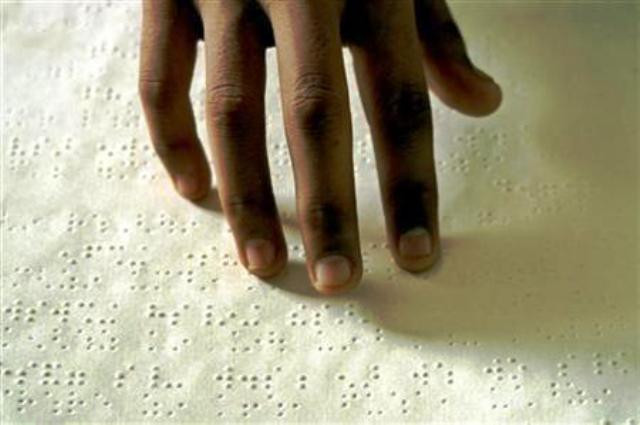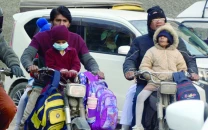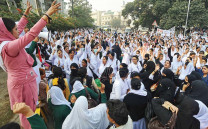LEARNING HOW TO SEE AGAIN
At the PAB, visually-impaired individuals learn how to look at life in a different light

LEARNING HOW TO SEE AGAIN
After spending 30 years of living his life with the ability to see, Ziaullah Raza wasn’t going to let his visual impairment hold him back.
He decided to join the Pakistan Association of the Blind to help him deal with the loss of vision caused by a disease called Uveitis, an inflammation of the middle layer of the eye, which left him visually impaired at the age 30.

Raza also decided to enroll himself in a computer training course at the association in order to continue working as an assistant pharmacist at the Pakistan International Airlines. “Life has become a lot easier for me since I completed the computer training course at the association,” he said, while talking to The Express Tribune. “I was depressed for a couple of months but then I accepted my fate.” He added that he took a few months off from work and is all set to start again in October.
How does PAB help the blind
The Pakistan Association of the Blind or PAB is a non-governmental and non-profit organisation which was established in 1974 by Dr Fatima Shah.
Dr Shah used to work for the All Pakistan Women Association (APWA) and lost her vision to Retinis Pigmentosa, an inherited, degenerative eye disease that causes severe vision impairment and often leads to blindness. She lost her sight at the age of 45 in 1960.
With help from Dr Isabella Grants, who was also visually-impaired, Dr Shah founded the Pakistan Association of the Blind in Karachi. Now, the association has branches all over the country which are run by the visually-impaired.
The general secretary of PAB’s Sindh chapter, Muzzaffar Ali Qureshi, lost his vision at the age of 16 but did not give up. He wanted to study more and decided to learn Braille. He pursued an MA in Islamic Studies from Karachi University and is currently teaching Islamiat at the Haji Abudllah Haroon Government College in Lyari.
“Many blind people get into teaching,” said Muhammad Shakeel, 37, who teaches IT at the association in the evenings and at Ida Rieu School in the mornings. “In Karachi alone, there are over 60 visually-impaired lecturers teaching at different government colleges.”
According to Shakeel, he was born blind just like his sister. His other siblings, he said, could see properly. He added that his wife was also blind at birth.
“People should be educated regardless of the fact if they were born blind or lose their vision later in life,” he said. “They should also receive mobility training as it will give them a much needed sense of independence.” He added that 10 years ago people were reluctant about spending money in educating a visually-impaired child but the attitudes have changed.
The government, according to Qureshi, can help if they implement the two per cent quota allocated for the disabled properly. “The Sindh government and other provincial governments should share data about employment for the disabled with us,” he said.
The association does not receive much funding from the government. Till a few years ago, it received around Rs45,00 which was raised to Rs200,000 in 2011 and then Rs400,000. This year, the association hopes it will get around Rs1 million.
At PAB, those suffering from any form of visual impairment can learn Braille, how to use a computer and about mobility. The association also organises summer camps for women where they teach them how to cook and do other things.
White Cane Day
Not just a walking stick
The white cane is a white walking stick that holds special significance in the life of visually-impaired individuals, said the general secretary of PAB’s Sindh chapter, Muzzaffar Ali Qureshi. “A blind person cannot move around without it. If you see a person crossing the road with a white stick, you should look out for them.”
The white cane became an important symbol for blindness in 1934 with the launch of the White Cane Movement in the US. The motive behind the movement was to create awareness among the masses about problems being faced by people with visual impairments. Three decades later, it was decided that October 15 would be observed as White Cane Safety Day all over the world.
The government, according to Qureshi, does not care about the blind. “Most of the roads in the city and across the country are in a bad condition,” he said. “Visually-impaired people who reside in developed countries do not suffer much because their governments facilitate them.”
Published in The Express Tribune, October 15th, 2014.


















COMMENTS
Comments are moderated and generally will be posted if they are on-topic and not abusive.
For more information, please see our Comments FAQ